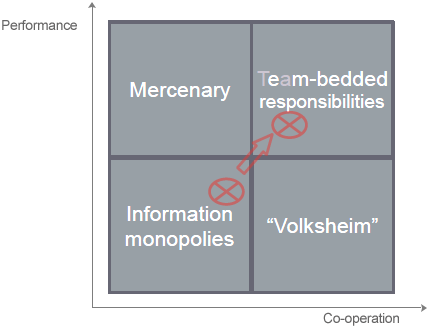Organisational Behaviour
"All successful organisations are alike; each unsuccessful organisation is unsuccessful in its own way." Adapted from Leo Tolstoi, Anna Karenina
Two terms excavated from 20th-century totalitarianism:
Volition is the complement to the school of Motivation which has been around since the 1970s. Volition vs. Motivation - these terms are not the same and because „volition“ has been misused by 20th century totalitarianism, a token of such being the 1930s German film ‚Triumph of Willpower’ („Triumph Des Willens“) by Leni Riefenstahl, the concept has fallen out of favour.
Understandably so, and Organizational Behaviour („OB“) research has been very reluctant to contend with this. The blanket discrediting was wrong because volition can be a force for good as long as it does not get detached from reason and successful organisations can harness it this as long as it is balanced.
The (capitalist) Relations of Production oder „Produktionsverhältnisse“ is a term from the communist manifesto by Karl Marx and could be used to capture a certain tension between an institutionalised order and the underlying or genuine forces of work or production („Produktivkräfte“). Not just in the realm of Compliance but generally, any organization should avoid too big an incongruence or even conflict between them. People working in an organization do sometimes - when they are lucky - experience that „lovely sense of flow“ (Lucy Kellaway) but to broaden this experience to an organization as a whole takes thoughtful process design and the dovetailing of functions: Business, Operations, Legal and Compliance. To be naturally working and structurally compliant at the same time would be the ‚ideally behaved organisation'.
Often, this is attempted by the use of a company’s intranet or a similarly designed communication overflow - and to be filed under failed superficiality - see the great but unrecognized divide.

Heretical thought
In Marxist terms, the management of a modern organization would certainly be branded „Überbau“ i.e. a non-core cultivated or artificial overlay on the true productive forces - good organisations do not even come close to this notion because their processes are naturally structured - or as old Karl would put it: the structures and processes of good companies accurately reflect the relations of production.
The great but unrecognised divide: information and communication
While information needs to be communicated, those two ought not to be confused. Successful organisations communicate effectively and this means distinguishing between these two terms.
Controlling information through communication channels is key. The term 'channel' is telling and rightly so. Channelling information through the organisation is far better than flooding people with it. This does not mean control in the meaning of imposing scarcity but creating basicism - if this term exists - while enabling optionality. Access to information which is not immediately relevant for the task at hand or the function is a real option but the value of any option lies in the freedom to decide which it provides.
An effective organisation is not over-matricised (who remembers ABB anyway?) but it is a more advanced version of painting by numbers. First you need the right numbers, i.e. choose the right people as multipliers, then you need to connect them intelligently, which is where information channels are coming in. The right flow of information is naturally begetting the right processes. It is about creating a naturally effective organisation by aligning and controlling (in a good sense) the flow and placing the points.
The practice of mass-emailing through the organisation could be referred to as CCD, the carbon-copy disease and it can cause the same madness as CJD. Sometimes it is not strictly individual confusion but done on purpose to deflect or disperse responsibility. On a corporate level, however, this is invariably madness.
Captured in an endless loop of fragmented information, organizations should take a leaf from the imaginary book of the Great Communicator rather than ineffectively churning words. Realising their own modest version of „Morning in America“ should be their objective. This needs the right structures as well as meaningful processes - and it is the same everywhere (hence the quote from Leo Tolstoi).
Do not despair - there will be no references to Maoism after one excursion already to Marxism. This is still 2016 - but it is not the House of Commons and no little red books will be brandished .
Of course, teams and teamwork, the eternal doctrine plus the same B-school terms all over. Yes, but it is about structural teams - and efficiency, performance and value proposition are the foundation on which every commercial organisation rests. Values alone do not buy lunch. They are the sprit behind the design of processes, the allocation of responsibilities and the contents and flow of communication.
Structural Teams

"Navigare necesse est!"
Pompeius meant the Mediterranean but here it is about sailing the sea of organizational behaviour
Any company should know and present what kind of organisation it we wants to be, also for the individual employee. How does the company envisage to perform on the trajectory of its value proposition/business model?
On unit level
- Cross-fertilisation of teams
- Best practice vs. uniform from day one
- Seeking efficiency gains
Naturally, any organization should aim for a Nash equilibrium and everybody will be happy. However, this does not work in real corporate life because of moral - or shall we say mental - hazard.
For instance, is it possible to take pay off the radar?

Heretical thought
Yes, but not for management. In many cases, there is an inherent greed not by their own fault but it appears a self-deceiving mirage emanating from the position at the top. It could be paraphrased as a ‚perverted Cartesian‘: „I am (boss) therefore I think (better than others).
Compensation - is there a Laffer curve with inverted parameters? The more I pay people, the more they perform but only up to a certain limit. This is inherent to their own productive aptitude and secondly their ability to amplify and multiply it through the organisation. They end up losing focus and the wisdom to restrain themselves, also a lack of modesty or even humility may come into play. This should normally lead to management’s productivity diminishing. Due to their position, it does not just plateau, it actually goes down, turns negative. Questioning oneself without becoming eternally despondent or even desperate could be an answer but this requires really rare qualities. These are normally only acquired by a formidable formation of character and this in turn is achieved through failures. The trouble is that people who have failed late enough in life to understand but early enough in their career to learn from it hardly ever make it to the top. This could be the mirror image of the Peter principle.
Now they are failing in the worst manner once at the top (think of Jean Claude van Damme: Maximum Impact) - without noticing it. They are organisationally protected or should we say insulated and detached - also from the consequences of their own actions. Cutting through this material, monetary and position-induced insulation is hardly possible. It would run counter to at least seeking a corporate Nash equilibrium - which must not omit management since any attempt to do so would only lead to heightened loss of focus. A captain who has a leak in their own cabin will not be bothered so much with staying the course. This is not inevitable. But honestly, there are more people like mini Maos out (or up) there than mini Fredericks the Great. This does not mean talking about crimes and despots, just about certain traits of psychological development.

Heretical thought
I know from experience that greed is a terrible thing - but only if it goes unfulfilled. Once it is fulfilled (although it can never be satisfied by its very nature), it morphs into something called entitlement. That is human and being human is actually a good thing. But is such tautology permissible?
People vs Processes
A common wisdom is to establish processes irrespective of the people and make people suit the processes. Processes are the framework supposed to provide stability beyond people's fluctuation. This is why they are supposed to take precedence and are usually designed without regard to the people who are meant to apply them. This is not ideal. On the other hand, relying on people's ingenuity or improvisation would introduce a level of unsystematic variation and hence uncertainty i.e. risk which is rightly unwanted and would hollow out any organisation.
What is the solution? Design processes 'bottom up' i.e. start with the people (not to mention that attracting and selecting the right people - plus keeping them (right) - is the essence of any successful organisation). Have due regard to the practicability and the discernible(!) reasonableness of processes. It is like in a marriage, a certain degree of attraction or attractiveness makes living together easier. And again as in marriage, divorce is costly. Not just the implementation of processes of separation but more the cost of having people leave. Often, some of these costs are semi-apparent by soaring consultant's bills to plug the holes ("of course, management have done all they could to stabilise“) - but in effect, this is fire-fighting rather than building the organisation fireproof) - other costs are hidden like the loss of corporate memory, level of engagement, etc. Management can only sort-of-control the quantity of skilled labour done but hardly the quality unless blatantly obvious. The more skilled the labour, the shallower the control. Fact.

Heretical thought
It's not only shit that flows downhill, it is also incompetence, or more accurately, its effects.
Key multipliers in a good organisation must be competent, intellectually and character-wise (it is fair to assume a correlation of at least 0.5 between these two parameters). Not self-preservation but rather the absence of management's perceived need of asserting it usually proves a boon to any organisation.

